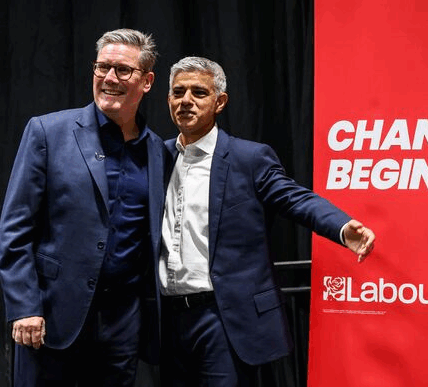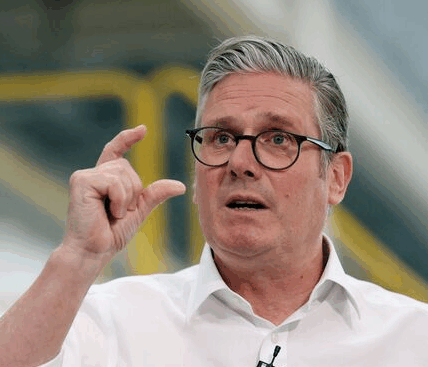Exclusive: The Chairman of the Migration Advisory Committee said falling fertility rates are creating a “really different situation” for ministers.

Ministers were given a stark warning (Image: Getty)
Britain’s population will fall sharply over the next three decades unless net migration hits around 200,000 every year, a leading expert has revealed.
Professor Brian Bell, Chairman of the Migration Advisory Committee, said the falling fertility rate is creating a “really different situation” for ministers and policy gurus.
And, to slash net migration to 0, as called for by Nigel Farage, Professor Bell concisely declared it would require drastic measures, including telling British nationals “you are no longer allowed to fall in love with a foreigner”.
Otherwise it is “just a pipe dream”.
He told the Sunday Express: “Going forward, we are in a very different situation than we have been for the previous 50/60 years.
“If you have net migration of 0 for the next 30 years, what you are actually saying is you want the population of the UK to fall significantly.
“The ONS predicted, and this is one of those predictions that is pretty strongly going to come true, the amounts of deaths and births of British people will essentially become negative. There will be more deaths than births because the fertility rate has gone down so much.
“If you have no migration, you will have the population of the UK falling and it’s quite dramatic – in the order of millions over the next 10-20 years. The alternative way – we could have net migration of 200,000 – 250,000 for the next 30 years – wouldn’t change the population.
“Net migration of 0 is really hard to achieve. In the last year, somewhere between 50,000 and 80,000 partners of British citizens came to the UK through the family route. Once they are here, they don’t leave. If you want net migration of 0, you either have to ban that, and say you are no longer allowed to fall in love with a foreigner, or you have to be sending out 50,000 to 80,000 people [on other routes].
“There’s quite a bit of immigration where it is quite hard to see how you change [things]. And if you can’t, then net migration of 0 is just a pipe dream.”
But would the public be happy with that, after years of broken promises and record numbers of arrivals? Tighter controls on overseas workers and foreign students led to a fall of 435,000 to 431,000, from a staggering 866,000 in the year to December 2023.
“What does the economy need? I don’t think it needs anything in particular”, Professor Bell argued. “In the end, net migration doesn’t have much impact on GDP per person. There will be times when you need more when there are shortages in particular sectors. What will the public accept? I don’t tend to look at public opinion polls too much. But when I do, I see lots of contradictions.
“You often see, for example when net migration is high, the argument that numbers need to come down. But when you ask which particular routes there should be a reduction in, they don’t want to reduce any of them. It’s much easier to say you want to reduce migration than to say where you want to do it. No-one wants to reduce the number of care workers and no-one wants to reduce the number of doctors and the number of nurses.

Chair of the Migration Advisory Committee Professor Brian Bell (Image: -)
“The only thing people were happy to see come down were bankers. But by the very definition, they are the most fiscally positive.”
The issue of whether migrants are contributing more to the UK economy than they are taking out is becoming an ever more dominant issue amid fears of wage suppression and Britain’s addiction to cheaper foreign labour.
One of the best examples of this is the social care crisis and the botched health and social care visa which became a de-facto backdoor route into the UK.
Ministers in February 2022 allowed overseas care workers to take up roles in the UK if they had a licensed sponsor and the role had a salary of at least £20,480.
And a recent Skills for Care report revealed how reliant Britain is on foreign social care workers.
The number of overseas care workers has rocketed from 215,000 in 2019/20 to 465,000 this year. And nearly one in four posts has been taken by a non-EU national.
The proportion of British care workers fell from 84.6% – 1.18 million people – to 1.13 million – 70.8% last year.
“Aldi is paying more to shack shelves and it’s an easier job. So why wouldn’t you do that?”, Professor Bell pointed out.
“In the short run, you can see why that was attractive for the Government because it helped them fill the social care gap, without having to think about the overall wages they are getting in that sector.
“But in the long run, they are not earning very much money. So, they are likely to be fiscally negative to the UK.
“It’s easy to imagine that bringing in care workers helped in the short-run but in the long run it would have been cheaper to just pay workers more and actually dealt with it domestically because you wouldn’t have a potentially costly group of people.”
Professor Bell said ministers would be right to ask what the correct “threshold” is to ensure migrants arriving in the UK to work are contributing more in tax than they are taking from the state.
He told the Sunday Express: “Most migrants stay in the UK for a long time.
“So actually, what you are really interested in is ‘what is the lifetime contribution? It doesn’t matter if they are fiscally positive today if, in the next 30 years, they are fiscally negative.
“The thing to think about is the long run, and there that’s quite different.
“Suppose someone came in aged 25, and was earning £55,000. They are probably going to be great for the long-run. They are probably going to have a great career and pay lots of taxes.
“If someone came into the UK aged 60 earning £50,000 that’s nowhere near as good because they probably only have a few years of earning that and then they will retire and probably start using up services like the NHS and social care.
“On the routes we are thinking about as an economic route, like the Skilled Worker Visa, where it is fundamentally about economics, we’re not bringing in workers because we think we have a humanitarian obligation. It’s because we think it’s good for the economy and society.
“There, I think it is quite sensible to ask the question, where would we want to draw the threshold to make sure they are fiscally positive?”
But Professor Bell issued a stark warning to politicians tempted to make migration promises to an increasingly disillusioned electorate.
“If you set targets you fail to meet, you look stupid and you lose the trust of the British public”, he said.
“One of the reasons we are in the state we are in is the promise of Cameron and May to get migration down to the tens of thousands was never achievable because when we were in the EU we could never control that immigration.
“It was a silly thing to promise and when they didn’t meet it, people began to say you’re not serious, you are not in control.”
Professor Bell argued Prime Minister Sir Keir Starmer and Home Secretary Yvette Cooper are right not to set a target on net migration.
Both have stressed the current levels are too high.
But it is getting “harder” for them to implement big changes to trigger sharp falls, the economics professor stressed.
He said: “The previous Government chose the things that were probably easier to introduce. The reforms that have been introduced in the new white paper are a whole collection of policies, each of them chipping away rather than any big change.
“It’s hard to come up with a big change that reduces it by 100,000 for example. You’ve got to chip away at different routes and think about where you can mark fairly marginal changes that add up to something.
“If they wanted to make big changes? You would either have to really consider our international obligations, you would have to think about the right to a family life, the right to the protection of a refugee. Otherwise, it has to be on the student or work visas.
“On the work route, I’m not sure there’s a lot more you can do except the thing that the Government has committed to – if you can do better on training British citizens… There is a win-win there, where you do the right amount of training people, and that makes them better off and they earn more.
“That’s a good thing to do full stop and it’s good for the economy. But it will also reduce migration as well.”

